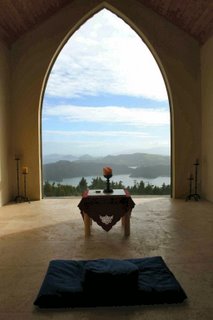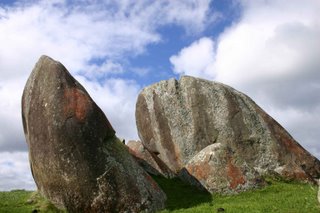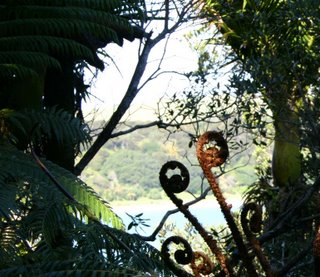Now I know why they called it a
cursor. Mine blinks defiantly at me on the screen in front of a grey day, almost taunting me to try and figure out what to write. There is nothing to figure out, and once I had gotten that, words and ideas emerge much easier.
I have written a bit lately about another great internet story,
YouTube, a wildly popular user-friendly site that oh, just plays
100 million video clips a day for a hungry audience, and the bright young guys that just sold it to Google for a billion and a half and some change. These are not just tech stories or get-rich-quick American success stories either. These entrepreneurs and purveyors of a very disruptive technology called
user-generated content, are the vanguard of the revolution in media that has been taking place over the last few years. A revolution taking place that effects the way we do just about everything in our lives. Particularly if we communicate, create, share, or otherwise collaborate with anyone on just about anything. Good luck to them. If you are interested in some of the videos that were posted over the year and a half of its independent life, drew huge audiences, and finally the attention of Google,
NPR has an article and links to some of the most popular here. And they are not all frat-boy type prank videos, but mainly clips from mainstream media that gained massive sudience share by way of their uniquely simple platform and distribution.
It is not without its challenges however for the new owners, who have copywrite issues galore to deal with, and have already
pulled 30,000 clips for that reason.
A Free Hugs campaign is something I definitely would not have seen anywhere else, and happy to have it forwarded. Worth a look.
Elsewhere in cyberspace, ominous clouds of greed appear to be gathering around the concept of Net Neutrality and cooperative commerce by none other than the providers of bandwitdth, (i.e. corporate media conglomerates) who apparently would like to enhance their position both financially as well as physically by deciding what content would be best for us to consume.
Bill Moyers has an excellent article here, and a short
video clip is here. Watch this space. It may not be the same for much longer.
Spring in New Zealand is a real hit-or-miss affair. We have the droves of "day trippers", boaties and other tourists out on the island looking for sunshine and creating long queues at the ferry terminal this weekend due to the Labour Day Holida. Sure enough, it is raining so hard right now, I can hardly hear Bob on the stereo. Great for the farms. Not so for holidaymakers trying to entertain the hordes of kids with boardgames I imagine.
Not quite the beginning of the camping season, most will find themselves supporting our local economy in the cafes or pubs today, before overloading the hopelessly under-resourced ferry system, which has at least 2 or 3 boats out of commission on one of the busiest holidays of the year. I think they blew another engine last week or something, I can't remember, it happens so often. Which is why I stay out here as much as I possibly can. Kayaks work well.
In grittier parts of the world, there is now a consensus of sorts that the debacle in Iraq, which many informed journalists have been declaring a disaster for the last 2 years, is finally reaching a Tipping Point, and major changes will ensue. Oh really?
This Guardian article sums up the wasted bloodshed and political fallout in the U.S. as well as Britain.
Our local cinema is showing
The Power of Community, How Cuba Survived Peak Oil again, a powerful doco detailing what happened in Cuba after the collapse of the Soviet Union. I like the approach that was taken, finding innovative and collaborative solutions
on a local level to problems that seem too large on a global level.
Dwelling still in the realms of the global, I haven't been flying much recently, more due to timing and the hassles involved than anything else (though I would like to think I remain conscious of the carbon dioxide released from jet aircraft).
Carbon trading is meant to be an incentive for us to "balance" the emissions we create from our activities with those that reduce those emissions. In case you are interested in how much CO2 is released on a flight from A to B, this
Climate Care site is one that can inform you on such details. My sisters wedding in California next February now appears to be more expensive than I first imagined.
The
Green Jet Setters have one more PR issue to deal with as a result.
Still, all one has to do is spend a few hours in the sun on a warm summers day down here in New Zealand, and it will become rapidly apparent something is not working in the atmosphere, and needs immediated attention (as will your skin from the super strong UVs).
A
bigger picture of the Spinach/E.Coli problem in the States recently from besteselling author
Michael Pollan (
Botany of Desire and
The Omnivores Dilemma).
And finally, for those of us who like to read alot, there are now (surprise!) digital readers that will download and carry lots of books around for you in yet another gadget. So far, not such good reviews, and personally, I like the feel of paper pages, rather than the scrolling a screen which often drives me mad on the computer.
This review in Slate Magazine asks if the new Sony Reader is the new iPod for books. Er, not quite.
 How does it feel
How does it feel







